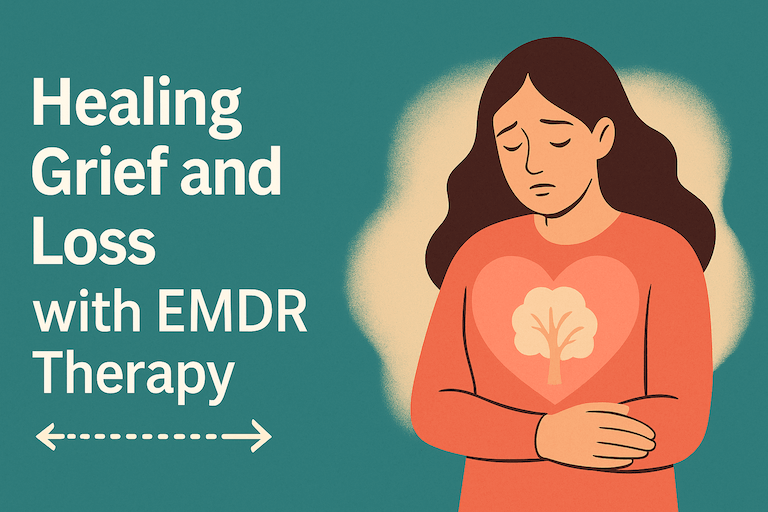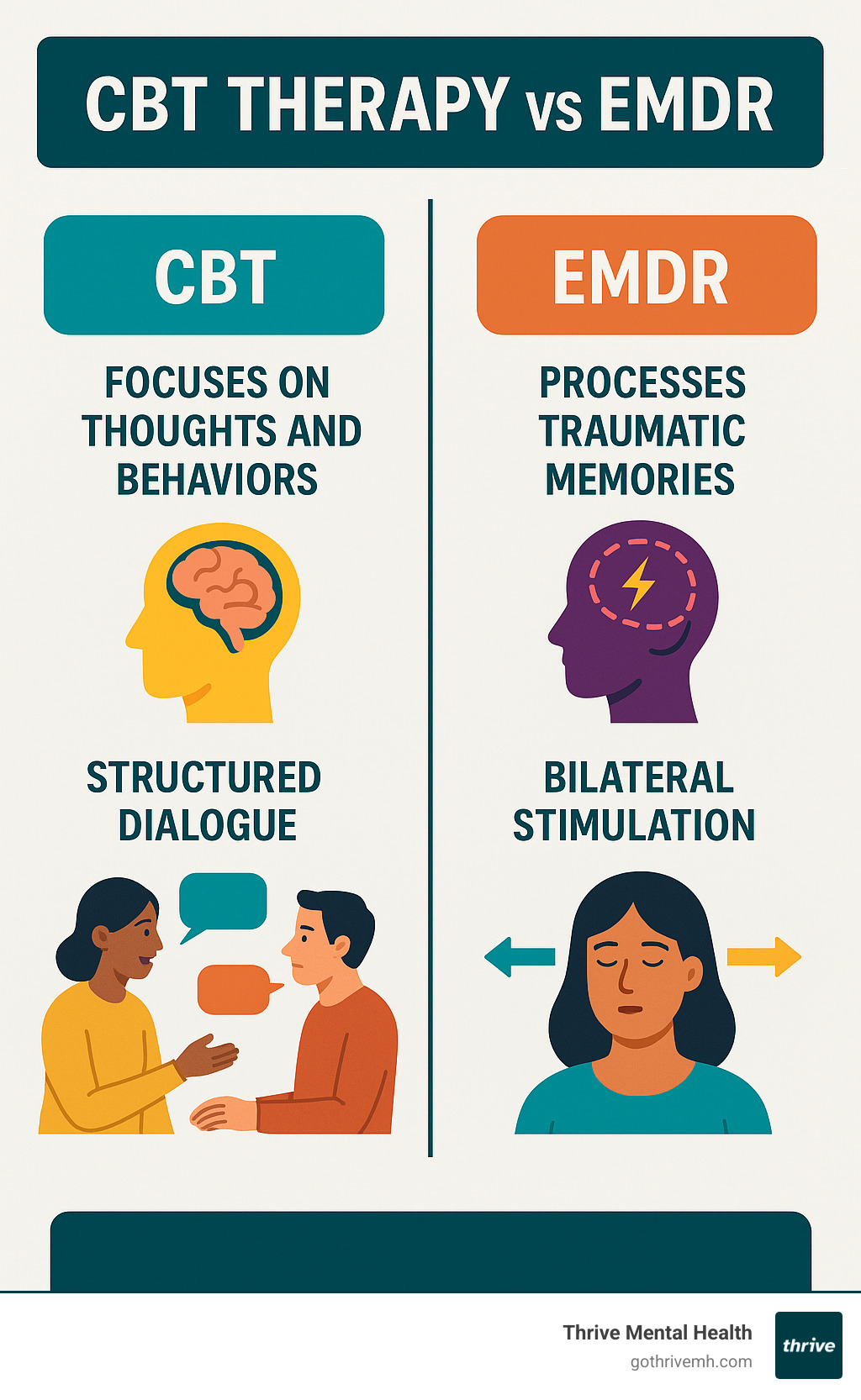Understanding EMDR Therapy: Exploring Its Advantages and Benefits for Psychological Health
EMDR treatment has arised as a notable technique in the domain name of psychological health, particularly for those coming to grips with trauma. Its structured technique of handling stressful memories establishes it in addition to traditional therapies. The potential improvements it offers for various emotional challenges require closer evaluation. As individuals seek effective solutions for their mental wellness, understanding the subtleties of EMDR might give essential understandings right into its applications and advantages. What lies below its therapeutic promise?
What Is EMDR Therapy?
Eye Activity Desensitization and Reprocessing (EMDR) treatment is an organized technique developed to minimize the distress connected with terrible memories. Developed by Francine Shapiro in the late 1980s, EMDR incorporates components of cognitive-behavioral treatment with bilateral excitement, commonly via assisted eye movements - emdr therapy. The treatment aims to help people process and reframe traumatic experiences, lowering their psychological fee and effect on every day life
During EMDR sessions, clients remember traumatic memories while all at once participating in particular reciprocal stimulation techniques. This double focus is thought to help with the mind's natural recovery processes, enabling the combination of disrupted memories. EMDR is usually utilized to deal with conditions like post-traumatic stress condition (PTSD), anxiety, and anxiety. Its organized nature and adaptable structure make EMDR available to a varied variety of customers, offering hope and alleviation from the burdens of unsettled injury.
The Science Behind EMDR
Comprehending the mechanisms underlying EMDR therapy discloses a fascinating interaction in between psychological procedures and neurological feedbacks. Research suggests that EMDR turns on the brain's info handling system, facilitating the combination of distressing memories. This procedure appears to engage the reciprocal excitement commonly used in EMDR, which can assist re-shape neural pathways associated with distressing experiences.
Research studies have actually revealed adjustments in brain activity patterns throughout EMDR sessions, specifically in locations related to emotional policy, such as the amygdala and prefrontal cortex. These adjustments recommend that EMDR might reduce the emotional charge of terrible memories, consequently enabling people to refine their experiences extra adaptively.
Additionally, neuroimaging studies highlight alterations in the default mode network, which may contribute in how individuals associate with their memories. Generally, the clinical exploration of EMDR highlights its prospective effectiveness in advertising mental wellness through a complex interaction of cognitive and neurological mechanisms.
How EMDR Works: The Process Explained
While several healing strategies concentrate on spoken handling, EMDR utilizes an unique method that integrates reciprocal excitement to assist in recovery. The process begins with the specialist aiding the client determine distressing memories or thoughts. As soon as these targets are developed, the therapist guides the customer via a collection of eye activities or various other types of reciprocal stimulation, such as tapping or acoustic cues. This stimulation is thought to help in refining the memories, permitting the brain to recycle stressful experiences more adaptively.
Throughout the sessions, customers might experience a variety of emotions and understandings as they face their memories. The therapist keeps a helpful environment, ensuring the customer feels secure during the procedure. After the stimulation, the specialist assists the client show on any adjustments in their feelings or ideas concerning the targeted memories. This organized technique intends to minimize the psychological fee connected with trauma, advertising a healthier frame of mind.
Benefits of EMDR for Injury Recovery
EMDR therapy supplies considerable advantages for individuals recuperating from trauma. It facilitates an accelerated recovery procedure, assisting customers process distressing memories extra efficiently. In addition, it reduces emotional distress and boosts coping skills, encouraging individuals to manage their experiences extra effectively.
Accelerated Healing Refine
As people seek effective techniques for overcoming trauma, the sped up recovery procedure offered by EMDR therapy stands apart as a transformative strategy. Unlike traditional restorative methods that might take years to generate outcomes, EMDR facilitates rapid processing of distressing memories. This approach permits customers to confront and integrate agonizing experiences in an organized fashion, frequently resulting in developments within a couple of sessions. The reciprocal excitement integral in EMDR helps to desensitize individuals to distressing memories, promoting a sense of security and control. As a result, customers often report considerable decreases in trauma-related signs. By speeding up the recovery trip, EMDR encourages people to recover their lives and move on with renewed resilience and hope, making it a valuable alternative for injury recuperation.
Lowered Psychological Distress
Emotional relief becomes possible via the application of EMDR treatment in trauma recovery. This therapeutic strategy promotes this page the handling of terrible memories, which frequently contribute to frustrating psychological distress. By utilizing bilateral excitement, EMDR allows clients to accessibility and reframe stressful experiences, decreasing their emotional cost. As individuals involve with their memories in a risk-free environment, they might experience a considerable decrease in concern, depression, and anxiousness connected with previous traumas. In addition, EMDR promotes a sense of security and empowerment, permitting individuals to challenge their emotions without ending up being overloaded. Therefore, customers typically report a boosted emotional state, promoting resilience and a much more well balanced perspective on their lives. This reduction in psychological distress is a vital benefit of EMDR treatment.
Boosted Coping Skills
While injury can leave people feeling helpless, EMDR treatment equips them with enhanced coping abilities that promote resilience and individual development. By addressing the origin of distress, EMDR aids clients determine and establish reliable strategies to manage their psychological feedbacks. These coping skills include mindfulness, grounding methods, and psychological law, which empower individuals to navigate difficult scenarios with better ease. As clients advance with EMDR treatment, they discover to recycle stressful memories, changing their perceptions and reducing feelings of anxiety and helplessness. This newfound ability to cope not only aids in trauma healing however additionally boosts general psychological health, leading to boosted partnerships and a more satisfying life. Eventually, EMDR promotes a sense of company that supports long-lasting emotional health and wellness.
EMDR and Its Efficiency for Stress And Anxiety and Anxiety
EMDR therapy operates on the concept of reciprocal stimulation, which may help people procedure and reframe stressful memories connected to stress and anxiety and depression. Research shows appealing scientific success rates, suggesting that EMDR can be a reliable treatment for these mental health problems. Comprehending the underlying devices and results of EMDR offers insight right into its restorative capacity.
Mechanism of EMDR
Countless research studies have shown the efficiency of Eye Movement Desensitization and Reprocessing (EMDR) treatment in treating anxiety and clinical depression. The system of EMDR involves reciprocal stimulation, usually through led eye motions, which helps with the handling of stressful memories. This dual interest enables individuals to recycle traumatic experiences while keeping a concentrate on the existing, decreasing psychological disturbance. EMDR intends to integrate fragmented memories, reducing their negative psychological impact. With organized phases, the treatment helps clients reframe their assumptions, fostering flexible ideas regarding themselves. This procedure not only eases symptoms of stress and anxiety and clinical depression but likewise boosts emotional guideline, leading to enhanced psychological health. Overall, EMDR's special approach provides a comprehensive structure for recovery psychological distress.

Scientific Success Rates
Research study suggests that EMDR therapy has actually revealed remarkable success rates in easing symptoms of stress and anxiety and clinical depression. Various find out this here research studies have actually shown that individuals going through EMDR frequently experience significant decreases in stressful symptoms within a fairly brief period. For example, a meta-analysis exposed that EMDR is as effective as conventional cognitive-behavioral therapy for dealing with both anxiousness and depression. On top of that, some individuals report enhancements after just a few sessions. EMDR's effectiveness is connected to its one-of-a-kind strategy, which assists reprocess terrible memories, resulting in decreased psychological distress. Individuals often reveal high complete satisfaction with their treatment end results, keeping in mind improved emotional law and total wellness. This evidence sustains EMDR's growing recognition as a valuable healing choice for mental wellness experts.
Discovering an EMDR Therapist: What to Take into consideration
When searching for an EMDR specialist, what essential factors should one think about to guarantee a great fit? First, it is important to verify the therapist's qualifications and credentials, ensuring they are educated especially in EMDR therapy. This training needs to be backed by recognized accreditations from respectable companies
Next, take into consideration the therapist's experience, especially with situations comparable to one's very own. Various therapists may have varying areas of focus and experience, which can greatly affect the restorative procedure.
An additional vital facet is the therapist's approach and style. A good rapport and comfort level between the client and therapist are important for efficient therapy.
Furthermore, useful considerations such as place, accessibility, and session prices need to not be forgotten. By meticulously reviewing these variables, people can make educated learn the facts here now options in their pursuit of EMDR treatment, boosting their possibilities for successful mental health end results.
Often Asked Concerns
Can EMDR Therapy Be Used for Youngsters and Teenagers?
Yes, EMDR treatment can be successfully utilized for children and teens. Research shows that it helps in processing traumatic experiences, aiding younger individuals create coping strategies and boost emotional law in an encouraging environment.
For how long Does an EMDR Therapy Session Commonly Last?
An EMDR treatment session usually lasts in between 60 to 90 mins. The period might differ based upon specific demands and healing goals, making sure that each session successfully addresses the customer's specific experiences and obstacles.
Is EMDR Therapy Covered by Insurance Policy Plans?
EMDR therapy insurance coverage varies by insurance policy plan. Some strategies include it as component of mental health and wellness benefits, while others may call for specific requirements to be fulfilled. Individuals must consult their insurance supplier for detailed info.
Exist Any Adverse Effects of EMDR Treatment?

The Number Of Sessions of EMDR Therapy Are Typically Needed?
Normally, people might need anywhere from 6 to twelve sessions of EMDR treatment, depending upon the intricacy of their injury and personal development (emdr therapy new york city). Some might require extra sessions for deeper issues or ongoing support
Eye Activity Desensitization and Reprocessing (EMDR) treatment is an organized technique created to ease the distress connected with terrible memories. Emotional relief comes to be possible via the application of EMDR treatment in trauma recovery. As customers advance with EMDR therapy, they find out to recycle terrible memories, transforming their assumptions and lowering feelings of anxiety and vulnerability. EMDR treatment operates on the concept of reciprocal stimulation, which might assist clients procedure and reframe stressful memories linked to anxiety and clinical depression. EMDR therapy might lead to momentary side impacts such as increased psychological distress, vibrant memories, or physical pain during sessions.